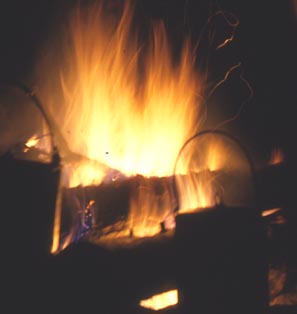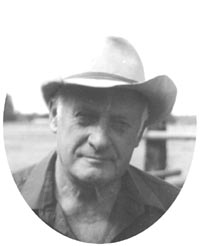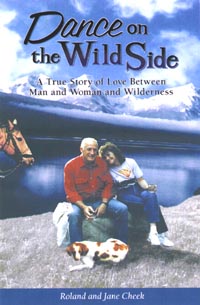a weblog sharing info on outdoor skills and campfire musing by a guy who spends a bunch of time in pursuit of both
CULTURE
WHERE -
TALES ARE TOLD OF
Welcome to Roland Cheek's Weblog
Roland is a gifted writer with a knack for clarifying reality. Looking forward to more of his wisdom
- Carl Hanner e-mail
When I say I believe in a Square Deal I do not mean, and nobody who speaks the truth can mean, that he believes it possible to give every man the best hand. If the cards do not come to any man, or if they do come and he had not got the power [skill] to play them, that is his affair. All I mean is that there shall not be any crookedness in the dealing.
[Where's Teddy now when we really need him?]
To access Roland's weblog and column archives
Tip o' the Day
The retired forest ranger told of his experiences taking a group of boys out to work as volunteers on trail projects. "There's nothing wrong with today's kids," the man said. "They're just as good as kids ever were. Our problem is we've emplaced a system that won't let them work."
He's right. It's easy to recall how naysayers of my youth claimed kids of that day weren't worth the powder to blow 'em to hell. Isn't it ironic those same kids who were so reviled in my youth are (now that they are grandparents) so critical of kids today?
Like the retired ranger, I believe in today's kids. I believe most of them want to work; want to do a good job; want to be respected (and praised) for their performance. Their problem--what my contemporaries believe mirrors laziness and an unwillingness to work--is the same problem of youth of any age: they have trouble seeing work that needs to be done.
I hired young guides back in the days when I led guests to adventure in some of the ruggedest lands in all the Northern Rockies. Without exception, those guides came to my outftt with a willingness to work and a driving desire to please. What they lacked was experience. How could they possibly understand the importance of adjusting an off-kilter pack before it rubbed a sore on the horse's back without first soring a horse? How could they know to mantie everything possible the night before pulling out for hunting camp without experiencing the time gain on the following morning?
They couldn't unless they were told. Then they still had to be shown how to accomplish it. But Lord did they know how to work! They worked from daylight to dark, day in and day out. They worked for little money and few material rewards. They worked for the sheer joy of "being" part of adventure, "because" of a zest for the outdoors, and "for" a love of wildlife.
The second half of the old ranger's critique constitutes a definite problem: that we've emplaced a system keeping kids from doing the kinds of quality work they'd like to achieve. Three "ell" words preventing them are laws, liability, and litigation.
I once read a truth I believe to be especially appropriate for this thesis. I don't know its source and my delivery may lack polish, but here it is: "Generation after generation, the very young do the impossible because no one bothered to tell them it is impossible."
That's my final word on the youth of today, except for this: There are three requirements for top performance for all people: 1) work at something you want to do. 2) be praised occasionally for a job well done; 3) receive a living wage.
If you are an employer and wish to receive top performance from your workers, pays special attention to 2) and 3).
MUCH FOR WHICH TO BE THANKFUL
Thanksgiving Day occurs on the 27th day of this month--two days hence. That same November 27 also happens to be the exact same day, fifty-four years earlier, that Jane and I married. We both have much for which to be thankful--most of all that our marriage survived our growing up while we developed a lasting love and friendship. Whether such relationship could've blossomed without being driven by the vehicle of outdoors adventure is an interesting question.
It was the lady's choice to marry an already-committed outdoorsman. The oddity was that she had no previous experience amid the rooks and rills, forests and hills. Neither did she learn outdoor skills quickly, for children came early in our marriage.
Jane did have a reasonably competent teacher when at last she had the time and freedom to learn. By then I was a full-time outfitter spending all my time riding isolated trails, floating remote rivers, operating wilderness camps. As a result, the lady had but two choices: join in or maintain a distance. She chose to jump in with both feet.
She learned quickly from that point, bringing artistry to campfire cookouts, identifying wildflowers by cross-referencing an already advanced understanding of domestic varieties. In addition, the woman proved excellent with people, exhibiting real concern for imagined complaints, mothering those wanting special consideration, becoming a confidant for those needing a listener. Our guests loved her. She was, after all, the outfitter's wife.
I loved her, too.
Jane learned to flyfish remote wilderness streams. And she learned to shoot the heads from grouse with the tiny Ruger Bearcat (.22) that she'd given me on our second anniversary together. In time, I also watched her carry wood, skin deer, saddle horses, and set up tents. I've watched her disappear into the deep forest with an empty coffee can and return three hours later with the can brimming with huckleberries that played well in pancakes and pies.
It's unfair that I worried about the woman after she'd spent decades watching me disappear into the sunset for days at a time--but I did. I worried that she didn't understand and didn't respect possible dangers.
For one thing, Jane has a decidedly less-than-refined sense of direction. Ask her to point east and unless she is fondling her morning's first cup of coffee as the sun barely peeps over a distant skyline, she has a three-chance in four of being wrong. For another thing, despite my warning about the dangers of climbing to places one cannot safely descend, she had to hang herself out to dry on a cliff face before believing the guy who's her best-friend and most worried husband. I've seen her thrown from a horse, frightened by the whirrr of a rattlesnake's buttons, and awed by a grizzly bear who seemed less than apprehensive in eyeing her. She has thrilled to the bugle of bull elk, made friends with deer, and glassed ledges where mountain goats roam.
And all the while, I loved her as much as when we first married.
I've watched the woman pilot rafts through whitewater, drive horses in from their pastures, brave windstorms, river ice, and bitter cold. We're a team, me and the woman I married over a half-century ago. We play together, work together, sleep together, dream together. For that we should be very, very thankful--and we are!
Make a living or make a life?
We chose life.
Roland Cheek wrote a syndicated outdoors column (Wild Trails and Tall Tales) for 21 years. The column was carried in 17 daily and weekly newspapers in two states. In addition, he scripted and broadcast a daily radio show (Trails to Outdoor Adventure) that aired on 75 stations from the Atlantic seaboard to the Pacific Ocean. He's also written upwards of 200 magazine articles and 12 fiction and nonfiction books. For more on Roland, visit:
www.rolandcheek.com
Recent Weblogs
Tuesday, November 25, 2008
for more info about these and other Roland Cheek books
There's a bunch of specific info about Roland's books, columns, archives and radio programs. By clicking on the button to the left, one can see Roland's synopsis of each book, read reviews, and even access the first chapter of each of his titles. With Roland's books, there's no reason to buy a "pig in a poke."
for detailed info about each of Roland's books
Read Reviews
Read their first chapters
For interested educators, this weblog is especially applicable for use in history classes, as well as for journalism students.
Roland, of course, visits schools. For more information on his program alternatives, go to:
NEXT WEEK:
SHOPPING FOR THE LITTLE WOMAN
www.campfireculture.com
Too honest to deny its roots in hunting, but too human to be contained by its limits, The Phantom Ghost of Harriet Lou is a book for those who care about wildlife of all kinds.
Check out Roland's office: sun roof, daylight basement, and no parking problems. Short takes, sage wit, large humor, all gleaned from an outdoors lifetime
Good grizzly mother? Or a savage killer. Your choice. An entire book about the life of a single charismatic grizzly bear
9 X 12 coffee table book about the best loved chunk of wild country in America: the place? Montana's Bob Marshall Wilderness . . . When? Then and now -- and always will be -- the way God made it.
source links for additional info
to send this weblog to a friend
to tell Roland what you think of his Campfire Culture weblog
to visit Roland's newspaper columns and weblog archives
- Theodore Roosevelt
To learn more of Roland's & Jane's exciting life as outfitters and guides in the Bob Marshall Wilderness, read Dance On the Wild Side
Learning To Talk Bear is Roland Cheek's best selling book -- now in it's 5th printing.
Safety in bear country? Of course! But this book also teaches the reader about the animals themselves.








